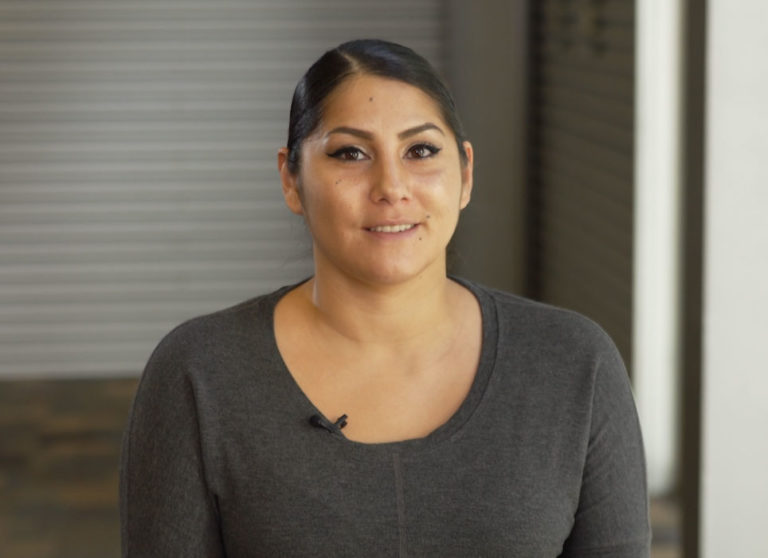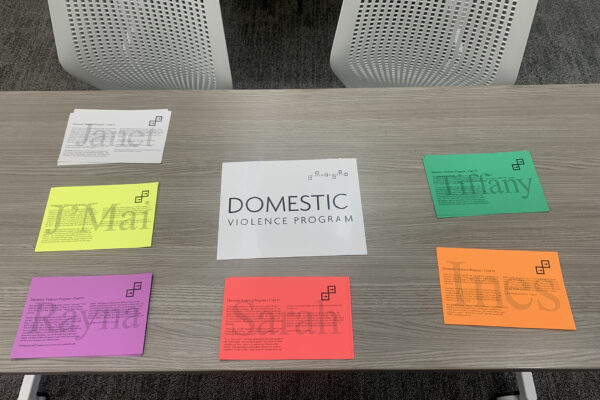
Cora Moonin needed to get out of the halfway house. She had sworn to herself that this time, after being in and out of jail since 2013, she would commit to making real change. She was making great progress, but she liked to get away from the halfway house whenever she could. So when someone handed her a flyer for Cook Inlet Tribal Council’s Fall Job Fair, she thought, Why not?
That flyer would change everything.
Wanting It
You missed out on so much already. Those words, spoken by Cora’s daughter, broke Cora’s heart.
But it was true: For years, Cora had focused on getting high, even though it meant that her children had to stay with their dad. “Then my own dad passed away, and I used that as an excuse to go deeper into drugs,” Cora recalled.
She’d been to jail for a short time before, but when she was arrested again, she served ten months. During that time, she got sober. And she was surprised to find that, for the first time, she wanted to change.
“Before, I didn’t care,” she said. “I didn’t have a job for a long time. I didn’t want to change. But toward the end of that ten months, I was doing so good. I felt better, healthier, and I was just tired of how things had been.”
From the halfway house, Cora started talking to her kids again and rebuilding her relationship with them. But if she wanted them to stay with her, she would have to create real change in her life.
That’s where the Alaska Native Justice Center (ANJC) would come in.
In Her Shoes

At the Job Fair, Cora struck up a conversation with a participant manning the ANJC booth. That day, she didn’t learn about a job, but about Moral Reconation Therapy (MRT) — a cognitive-behavioral program that leads to better moral reasoning, decision-making, and appropriate behavior among offenders and those who struggle with substance abuse.
Cora had never undergone treatment for her addiction. “Everyone was like, why would you just join MRT?” she confessed. “It sounded like a good idea, and I’m really glad I did. It helped open me up to being accountable for my own decisions and actions.”
Benny also helped. ANJC Reentry Case Manager Benjamin Briggs not only understood Cora’s knack for avoiding accountability and her “they’re out to get me” attitude — he had been in her shoes.
“I felt like Benny and the other case managers actually understood my situation because they had gone through jail, too,” Cora said. “That was a big inspiration for me to do better.”
“Cora has learned a lot,” Benny said. “When she first joined MRT, she almost got kicked out of the program for not wanting to open up. I look at her today, I see a glow. I see the change. When I first met her, there was no glow — just stress and confusion.”
Ready
Cora credits MRT with setting her up for success once she sought treatment for substance abuse. “It gave me more of a positive attitude. And it brought me out of my shell and made it easier for me to talk to people.”

At the treatment center, she met her clinician — a man who had previously been in treatment himself and who had worked his way up to a job. “I thought, I want that,” she remembered. “If he can do it, I can do it.”
Today, she has done it: Cora is employed by the same center where she received treatment, working with peer groups. She’s in a healthy relationship with her boyfriend, and now she sees her children on a regular basis.
“My life has changed a lot,” Cora reflected. And she’s ready for more change — ready to spend more time with her kids, ready to move forward in her career helping others who are working through addiction. That’s her advice to people coming to ANJC for the first time: “Be ready for change. It’s work, and it’s hard, but that’s the place to start.”




